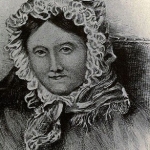I was Little Albert.
Nine months old in the famous film.
In a white cotton nightie, on a lab
table sitting upright
facing a camera.
remember me? Sure.
You do.
First, you saw that I was a “curious” baby.
You saw that I blinked and stared
with all the intensity of an infant-brain
eager to suck into its galaxy of neurons
all of the world. You saw that
I was you.
You saw that I was a “fearless” baby.
You saw that I was not frightened
of a burning newspaper held before me
at an alarmingly close range.
Though indeed my rapt infant face
expressed the classic wariness of our species.
Next, you saw that I was not frightened
of a frisky monkey darting close about me
on a leash. You saw
that I was not frightened
by a large dog brought close to me
nor by a quivering rabbit, nor
a small white rat—
nor even a Santa Claus mask
worn by a menacing male figure
clad in white, shoved close
to my infant face.
You saw that I was attracted to the small white rat.
You saw that I reached out to touch the small white rat.
And as I reached for the small white rat
behind my head came an explosion of noise—
the shock of it sent me sprawling, cringing,
face contorted in terror, mouth
a perfect O of anguish, howling—
as the experimenter John Watson struck
a metal pipe with a hammer.
What a shock!—how terror
rushed through me. How
desperately I crawled
to escape almost toppling
off the edge of the table—
except adult hands restrained me.
Children naturally fear loud noises.
children naturally fear surprises.
Children naturally fear the unknown.
Children can be taught to fear the known.
The second experiment was one month later.
No escape for me for I was Little Albert.
Grim as a little gargoyle
in white cotton nightie able
to sit upright though now wary,
distrustful. No joy in my little body
as (again) a small white rat
was introduced to me. You saw
how this time I shrank away. How
this time there was terror in my face.
How this time I did not reach
with infant eagerness for the small white rat
for I’d learned to fear and hate
the small white rat. And again
(you saw) how the very presence
of the small white rat
precipitated a deafening clamor
as John Watson another time
struck a metal pipe
with a hammer again, again and
again behind my head for
who was there
to stop him? In this way
establishing on film
how (baseless) fear can be instilled
in a subject where fear had
not previously existed and
how memory of this (baseless) fear
will endure contained
in the unfathomable brain.
How I cried and cried! As if
I’d known that my mother had
received but one dollar for
the use of me in John Watson’s psych lab
in the experiment that would destroy me
and make John Watson famous.
For in the alchemy of my brain
my fear of a small white rat
had become generalized
and now (as Watson ably demonstrated)
I feared the monkey, the dog, the rabbit
equally though each was unaccompanied
by a clanging hammer.
Now I feared the menacing figure
in the Santa Claus mask as if
understanding that Santa Claus
was my tormentor. Cried
and cried and could not be
consoled, even a woman’s
fur coat terrified me for
how could I trust softness?
Sudden movements, sounds
behind my head—
the unexpected ...
Classic Pavlovian conditioning.
Bedrock of behavioral psychology.
Brilliant pioneer John Watson!
You are wondering: did John Watson
decondition me? No. He did not.
Did another experimental psychologist
decondition me? No. He did not.
Ask me what was the remainder of my life.
Ask me did I adjust to life after the
infamous experiment. Ask me
did I overcome my terror of animals?—
the answer is not known for
I died of hydrocephalus at age six.
All this was long ago. Things are different now.
John Watson would not be allowed to terrorize
Little Albert in his famous experiment now.
Ours is an ethical age.
Or was it all a bad dream? Were you deceived?
You were Little Albert? You were conditioned
to fear and hate? You were conditioned to
thrust from you what you were meant to love?
You were the victim? You were the experimental subject?
You were Little Albert, who died young?



















Comment form: